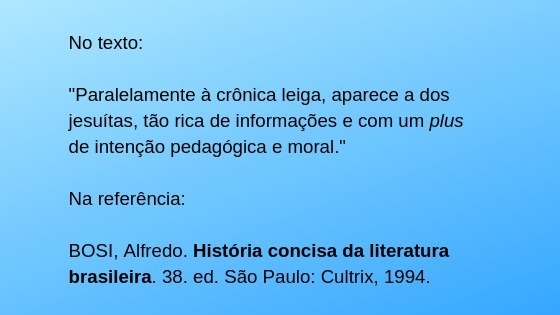O Narrative Focus is a key element of narrative texts as it determines the type of narrator of a narration.
In other words, the narrative focus represents the "voice of the text", being basically classified into three types:
- Narrator character
- Observer Storyteller
- omniscient narrator
Storyteller Types
It is important to remember that the narrative focus is determined according to the perspective used by the author to tell a certain story:
This type of narrator is one of the characters in the story (protagonist or supporting). In this case, the story is narrated in 1st person singular or plural (I, we).
Example narrator character
“One night, coming from the city to Engenho Novo, I met a young man here in the neighborhood on a train from Central, whom I know by sight and with a hat. He greeted me, sat down beside me, spoke of the moon and the ministers, and ended up reciting verses to me. The trip was short, and the verses may not have been entirely bad. It so happened, however, that, as I was tired, I closed my eyes three or four times; so much was enough for him to stop reading and put the verses in his pocket.” (Dom Casmurro, Machado de Assis)
This type of narrative focus presents a text narrated in 3rd person (he, they). It is determined by a narrator who knows the story and, therefore, is called “observer”.
In this case, the narrator does not participate in the story and is outside the facts, that is, he is not a character.
Observer Storyteller Example
“What a gulf there is between the spirit and the heart! The ex-teacher's spirit, vexed by that thought, shuddered its way, looked for another subject, a canoe that was passing by; the heart, however, allowed itself to be beating with joy. What does he care about the canoe or the canoeman, which Rubião's eyes were following, wide open? He, my heart, goes on saying that, since Mana Piedade had to die, it was good that he didn't marry; a son or a daughter could come... - beautiful canoe! - Before that! - How well it obeys man's oars!
- The truth is, they are in heaven!” (Quincas Borba, Machado de Assis)
Here, we must pay attention to the concept of the word omniscient, which means “one who knows everything”. That said, as a narrative focus, the omniscient narrator is the one who knows the whole story.
She also has knowledge about all the characters and their thoughts, feelings, past, present and future. It can be narrated both in 1st person (when she presents the characters' thoughts) as in 3rd person.
Omniscient narrator example
“A second later, still very soft, the thought grew slightly more intense, almost tempting: Don't give it away, they're yours. Laura was a little startled: because things were never hers.
But these roses were. Pink, small, perfect: they were. He looked at them in disbelief: they were beautiful and they were his. If he could think any further, he would think: its like nothing so far had been.” (The Imitation of the Rose, Clarice Linspector)
Narrative Structure and Elements
The basic structure of the narrative text is: presentation, development, climax and outcome.
THE narration is a type of text based on the actions of characters and characterized by a certain time and space. Highlights include the novel, the novel, the chronicle, the short story, the fable, the legends, among others.
The main elements that make up a narration are:
- plot (story);
- characters (those who make up the narrative);
- time (period in which the narrative develops);
- space (place where the events triggered in the narration occur).
Note that the narrative text cannot be determined without a narrative focus, that is, someone who is responsible for the “voice of the text”. However, we must not confuse the “voice of the author himself” and that created by him to narrate the story.
In this sense, it is worth remembering that the author of the text is the real person and the “voice present in the text” is, in most cases, a narrator created by him.
Learn more at: Narrative Elements and Plot.
Entrance Exam Exercises with Feedback
1. (UFV) Consider the text:
"The incident that will be narrated, and of which Antares was a theater on Friday, December 13, 1963, made this place known and, in a way, famous overnight. (...) Well, but it is not advisable to anticipate facts or sayings. It would be better to tell first, as succinctly and impartially as possible, the story of Antares and its inhabitants, so that one can have a clearer idea of the stage, the scenery and especially the main characters, as well as the companionship, of this drama perhaps unheard of in the annals of the species human.”
(Fragment of the book Antares incident, by Érico Veríssimo)
Check the alternative that highlights the role of the narrator in the fragment above:
a) The narrator has a practical, utilitarian sense and wants to convey a personal experience.
b) he is an introspective narrator, who reports experiences that took place in the past, in 1963.
c) In an attitude similar to that of a journalist or a spectator, he writes to narrate what happened to x or y in such a place or at such a time.
d) Speak in an exemplary manner to the reader because he considers his vision to be the most correct.
e) he IS a neutral narrator, who does not let the reader perceive his presence.
Alternative c: In an attitude similar to that of a journalist or a spectator, write to narrate what happened to x or y in such a place or at such a time.
2. (Fuvest)
“(...) Escobar was thus emerging from the grave, from the seminary and from Flamengo to sit with me at the table, receive me on the stairs, kiss me in the study in the morning, or ask me for the usual blessing at night. All these actions were repulsive; I tolerated them and practiced them, so as not to discover myself and the world. But whatever I could hide from the world, I couldn't do it to me, who lived closer to me than anyone else. When neither mother nor child was with me my despair was great, and I swore to kill them both, now by blow, now by slowly, to divide by the time of death all the minutes of life blurred and agonized. When, however, I returned home and saw at the top of the stairs the little creature who wanted and was waiting for me, I was unarmed and deferred the punishment from one day to the next.
What passed between Capitu and me in those dark days will not be noticed here, because it is so small and repeated, and already so late that it cannot be said without failure or fatigue. But the main one will. And the main thing is that our storms were now continuous and terrible. Before discovering that bad land of truth, we had others that were short-lived; soon the sky turned blue, the sun clear and the sea flat, through which we opened again the sails that took us to the most beautiful islands and coasts of the universe, until another gust of wind destroyed everything, and we, put on the cover, awaited another calm, which was neither late nor dubious, but total, close and firm (...)”.
(Fragment of the book Dom Casmurro, by Machado de Assis)
The narration of the events that the reader is faced with in the novel Dom Casmurro, by Machado de Assis, is done in the first person, therefore, from the point of view of the character Bentinho. It would therefore be correct to say that she presents herself:
a) faithful to the facts and perfectly suited to reality.
b) addicted to the one-sided perspective assumed by the narrator.
c) disturbed by Capitu's interference that ends up guiding the narrator.
d) exempt from any form of interference, as it aims at the truth.
e) indecisive between reporting the facts and the impossibility of ordering them.
Alternative b: addicted to the one-sided perspective taken by the narrator.
3. (And either)
The game
I woke up at dawn. At first calmly and then with obstinacy, he wanted to sleep again. Useless, sleep was exhausted. With caution, I lit a match: it was after three. I therefore had less than two hours, as the train would arrive at five. Then came the desire not to spend another hour in that house. Leave, without saying anything, leave my chains of discipline and love as soon as possible.
Afraid of making a noise, I went to the kitchen, washed my face, teeth, combed my hair and, returning to my room, dressed. I put on my shoes, sat for a moment on the edge of the bed. My grandmother was still sleeping. Should I run away or talk to her? Well, a few words… What was it for me to wake her up, say goodbye?
LINS, O. The game. Best tales. Selection and foreword by Sandra Nitrini. São Paulo: Global, 2003.
In the text, the narrator character, on the verge of departure, describes his hesitation in separating from his grandmother. This contradictory feeling is clearly expressed in the excerpt:
a) "At first calmly, and then with obstinacy, I wanted to sleep again"
b) "Therefore, I had less than two hours, as the train would arrive at five"
c) "I put on my shoes, sat for a while on the edge of the bed"
d) "Leave, without saying anything, leave my chains of discipline and love as soon as possible"
e) “Should I run away or talk to her? Well, a few words…”
Alternative e: “Should I run away or talk to her? Well, a few words…”
Read too:
- Text Types
- Textual genres
- Narrative text


